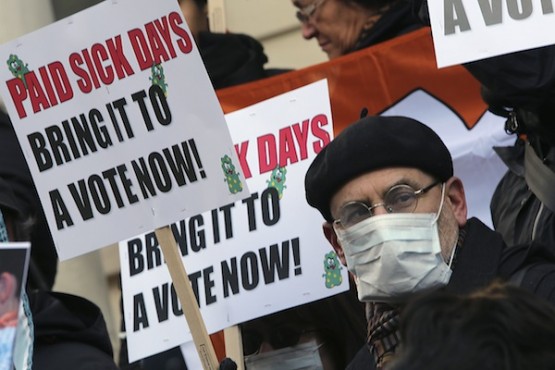Expanding DC’s Paid Sick Days Would Bring $7.9 Million In Benefits To Employers

While Washington, DC has a law that requires businesses to give workers between three and seven paid sick days a year, lawmakers in the city council are pushing to expand it to cover tipped workers, who are currently excluded. A new analysis from the Institute for Women’s Policy Research finds that doing so would bring about $7.9 million in benefits to employers in the area each year.
The benefits come mostly from reducing worker turnover. “Because workers value earned sick days, when they have that benefit, they are less likely to look for a different job,” the report notes. The analysis predicts a 5 percent reduction in turnover, saving employers about 20 percent of the total compensation for those who stay on the job. Illnesses in the workplace also cost employers in reduced productivity to the tune of about $533,000 a year. The savings of avoiding that drop in productivity are expected to come to $7.45 per worker a week, or 20 cents per hour per covered worker.
While the expansion will come with a cost for employers, it is still expected to net them about $2 million in savings when those costs are taken into consideration, the equivalent of $1.85 per worker per week.
The community also saves thanks to reduced nursing stays and emergency department visits and the reduction in the spread of the norovirus and flu. Those effects will save just over $1 million a year.
?????There’s already evidence that DC’s current law hasn’t been the job killer critics claim. It hasn’t discouraged business owners from basing headquarters in the city, nor has it encouraged them to move. The law has also significantly increased the number of businesses that provide paid sick days, from half before its passage to nearly 70 percent in 2012. Yet nearly 80 percent of the city’s restaurant workers say they don’t get paid days off for sickness or to care for an ill family member. As a result, nearly two-thirds have had to work while sick.
Five other cities — Jersey City, NJ; Portland, OR; New York City; San Francisco, CA; and Seattle, WA — and the state of Connecticut also have paid sick days policies. Evidence from their experiences also points to little cost to employers while boosting job and business growth. There are currently efforts to enact similar legislation in Newark, NJ; Tacoma, WA; and the states of Massachusetts,New Jersey, and Vermont.
